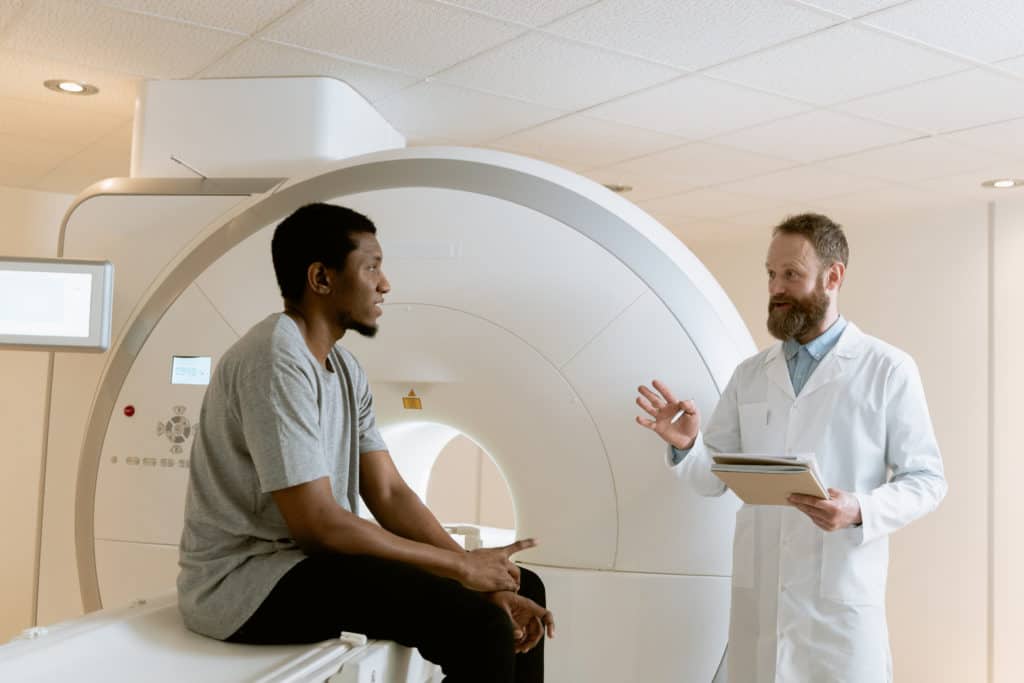Early diagnosis of cancer can significantly increase your chances of successful treatment — but there are many scans out there that can be used to detect cancer, so it can be difficult to know which is the right one for you.
In this article, we will be talking about three types of cancer screenings in particular — MRI, CT scans and blood tests. We’ll be looking into how accurate they are, which cancers they can detect, and why they’re preferred over other scans to detect cancer. We’ll also be covering why choosing a multi-scan full body health check programme can benefit you.
Find out more below.
Types of scans for cancer
There are many different types of scans or imaging tests that can be used to detect cancer (Cancer Research UK, 2022).
Certain scans can detect different types of cancer, so the right test for you will depend on the symptoms you have, any risk factors, and the part of the body that is affected. If you are taking preventative measures and carrying out a full-body health assessment due to a family history of cancer, a number of different scans will be used.
Here are some of the types of scans for cancer detection and diagnosis:
- CT scans
- MRI scans
- Blood tests
- Ultrasounds
- X-ray
- Mammograms (a type of X-ray)
- PET-CT scans
In particular, MRI scans, CT scans and blood tests are often the preferred choices to detect cancer because of their accuracy, low risk levels, and reliability.
We will be looking into these three types of scans for cancer in more detail below.
CT scan for cancer
A CT scan (Computed Tomography scan) uses X-rays to capture a number of images from different angles around your body. Computer processing is then used to create detailed, cross-sectional images of inside the body.
CT scans can produce detailed images of many different internal structures, including bones, organs, blood vessels and soft tissues. They are also much more detailed than normal X-rays.
MRI scan for cancer
An MRI (Magnetic Resonance Imaging) scan uses radio waves and strong magnetic fields to create a detailed image of the inside of your body.
An MRI machine looks like a large ‘tube’ that you lie inside during the scan. These may be narrow or more open, which suit patients who have claustrophobic tendencies.
MRI scans don’t use X-rays or any other types of radiation, which makes them very safe. If a physician is looking for issues or cancer in the reproductive system (both male and female), they will likely use an MRI.
Blood test for cancer
Sometimes, a doctor or physician may suggest a blood test for cancer detection.
Blood tests can tell us a lot about our general health, as well as helping to diagnose cancer and other conditions (Macmillan.org, 2019).
During a blood test for cancer, a blood sample will be taken (usually from a vein in your arm), before being sent off to a laboratory for further investigation. There, a specialist technician or doctor will look at your sample under a microscope, which allows them to see different types of blood cells as well as the number of cells.
Blood sampling is very safe on the whole, with a small possibility of bleeding, bruising or mild pain.
How accurate is a CT scan for cancer?
CT scans are very accurate and have a range of benefits. The images that we get from a CT scan are high-resolution and can provide us with lots of useful detail.
CT scans can be used to detect and diagnose cancer, establish what stage a cancer is at, and determine the size and shape of a tumour. They can also be used to establish how close a tumour is to nearby internal organs or structures, check for any nearby blood vessels and help plan effective, successful treatment.
Doctors can also use CT scans to monitor how well treatment is going and in post-treatment follow-ups.
Overall, CTs are considered to be very effective at detecting cancer because they provide accurate, high-quality images quickly.
How accurate is MRI in detecting cancer?
MRI scans can be used to look at most areas of the body, and can produce more accurate results than a CT scan in some cases.
MRI scans show up soft tissues very clearly and create very detailed images of inside the body, which is why doctors will often suggest an MRI scan for cancer detection.
An MRI scan can be used to accurately examine many different parts of the body, including your brain, spinal cord, heart, blood vessels, breasts, bones, joints, internal organs such as the liver, womb, and prostate gland. This means that they are particularly effective at diagnosing cancer in these places.
However, MRIs cannot provide adequate images of the colon, lungs or coronary arteries.
How accurate are blood tests for detecting cancer?
Blood tests can be used to accurately detect and diagnose certain types of cancer. There are a few different types of blood tests that are used in particular for detecting cancer.
For example, the tumour marker blood test (Cancer.net, 2020) is one such test that can be used to help diagnose cancer.
Tumour markers are substances — usually proteins — that can be found in the blood (as well as body tissue or urine). Tumour marker levels might be raised if there is a cancer present in the body. Some are only produced by one type of cancer, while others are made by several types, so although they can help us to detect the presence of cancer, they may not always be able to pinpoint exactly what type it is.
There are some limitations to tumour markers blood tests. Sometimes, other conditions or diseases that aren’t cancer can raise levels. Tumour levels may not go up in early stages of some cancers, and in some individuals might not even go up at all.
A new type of blood test for cancer is currently being trialled too. The Galleri test (NHS, 2021) can detect more than 50 types of cancer before any signs and symptoms even appear.
The test is quick and simple but could help medical professionals to catch cancer in the early stages so that there is the best possible chance of treating it successfully.
CT scan vs MRI: what can they detect?
Both CT and MRI scans are effective scans to detect cancer. But which is better?
The answer depends on the type of cancer and the area of the body.
CT scans aren’t able to image all tissues, so we can use MRIs (or ultrasounds in some cases) to scan these tissues. MRI scans are better at showing cancers that a CT scan can’t pick up, such as prostate cancer, uterine cancer, and certain liver cancers. All of these are very hard to detect on a CT scan.
On the other hand, MRIs can’t provide detailed images of the lungs or colon. In these cases, we can use CT scans, which are able to detect lung cancer and colon cancer. CT scans can also be used to detect cancer of the liver, gallbladder, spleen, pancreas, adrenal glands, kidneys, bladder and lymph glands.
Why might you need a CT scan and an MRI?
Sometimes, having both a CT scan and an MRI is recommended.
Although both types of scans can produce detailed, high-quality images of the inside of the body, using both scans in tandem can ensure that nothing is missed when it comes to cancer detection.
In some situations, your doctor may suggest an MRI scan to follow a CT scan if they haven’t been able to get everything they need from the CT.
MRI scans can also be used to how deep a tumour has grown into body tissues in certain cancers such as cervical or bladder cancer — which both typically use CT scans for detection.
MRIs may also be recommended for post-treatment check-ups, to detect whether any tissues left after treatment are cancerous or not.
The benefits of choosing a cancer programme
Although each type of scan has its benefits, choosing a holistic cancer programme that incorporates a range of effective and accurate tests is much better than opting for any one single type of scan.
At Echelon Health, we offer a Core Cancer health package that adopts a combination of cancer screenings, including the scans we’ve mentioned above and more.
Our Core Cancer programme uses high-quality imaging technologies such as MRI, CT and ultrasound, in conjunction with blood tests, digital mammograms and more for a complete and comprehensive health assessment.
Find out more about our Core Cancer screening package here.
Sources
Cancer.net (2020). Tumor marker tests. Available at: https://www.cancer.net/navigating-cancer-care/diagnosing-cancer/tests-and-procedures/tumor-marker-tests (Accessed 19/01/22).
NHS (2021). NHS launches world first trial for new cancer test. Available at: https://www.england.nhs.uk/2021/09/nhs-launches-world-first-trial-for-new-cancer-test/ (Accessed 19/01/22).
Macmillan.org (2019). Blood tests. Available at: https://www.macmillan.org.uk/cancer-information-and-support/diagnostic-tests/blood-tests (Accessed 19/01/22).
Cancer Research UK (2022). Tests and scans. Available at: https://www.cancerresearchuk.org/about-cancer/cancer-in-general/tests (Accessed 19/01/22).



